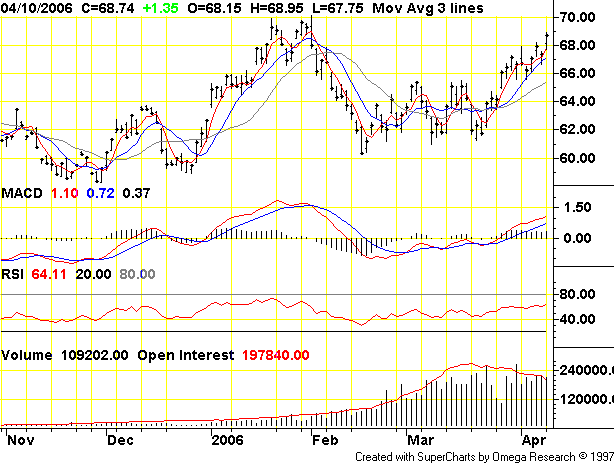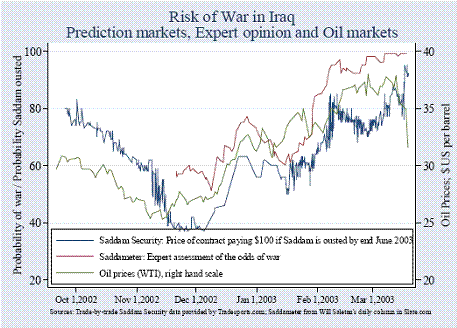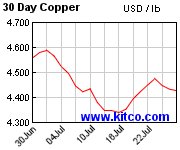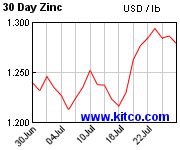More talk this week of war with Iran, and the price of oil jumps right up. Maybe the two are related, and maybe not.
 |
 |
As war talk and oil prices both escalate, it’s easy to start thinking we’ve been here before. The graph at the right, taken from a recent paper by
Justin Wolfers at the University of Pennsylvania and Eric Zitzewitz at Stanford, reminds us of what happened in 2002-03. The graph tracks the price of oil, experts’ assessments of the probability of war, and the probability of war as implied by the price of a contract that would pay $100 if Saddam were ousted by June 2003. Fast forward to 2006, with oil prices as shown in the graph above and talking heads discussing the possibility that the U.S. might use nuclear weapons against Iran, and it seems a bit too close to deja vu for comfort.

|
Except one detail– the prediction markets aren’t playing along with all the war talk this time. The price for which you could purchase a contract through Tradesports that will pay you $100 if there is an airstrike against Iran within the next year has been going down, even as the talk has escalated. That’s consistent with Tyler Cowen’s conjecture that war-plan leaks are being used intentionally to try to achieve a diplomatic objective.
But while the price of a Tradesports contract has been moving against the price of oil, I can think of at least three things that have been moving right in step with oil: gold, copper, and zinc. Would risk of war raise the price of copper? I’m thinking not. Would strong commodity demand drive up the price of all four? I’m thinking it could.
At least it’s a cheerier story than that of Seymour Hersh. But if you prefer to take the gloomy interpretation, by all means, be my guest. Just buy yourself a few of those Tradesports contracts on your way out. Might as well be rich and gloomy rather than poor and gloomy.



Technorati Tags: oil prices,
oil, Iran
JDH,
All this war talk naturally impacts oil prices. What about the “other side of the coin”? In this case Iran? I read in the Economist that everytime war talk escalates in Tehran the market in Iran suffer.
As oil is solid on the world market, in theory everyone participating fairly in the world market suffers. Maybe these short-term (hopefully) adjustments bring everyone to thier senses.
What would be the effect of Iran shooting perhaps 10 missiles at the Saudi Gas Oil Seperation plants. Would not have to be super accurate, and all the facilities are within easy range of Iranian missiles. How long to repair the facilities? 6 month? a year? Without GOSP’s production at the major oilfields would have to come to a standstill. Where would the price of oil be if saudi production were to decline by say 85-90% for 6 months?
War and copper? Well we are leaving a lot of cartridge brass on the ground (brass being copper and zinc, the two metals graphed above). That’s probably a coincidence though.
I do think the “commodity bull market” must hold some key, but the common wisdom (asian demand) is probably the right answer.
James Hamilton,
I think you make a good point. Thanks for the post.
So MG’s posted the US strategy. So here’s the Iranian strategy currently bouncing around the blogs:
The Iranian leaders are not, in fact, mad. They are intentionally provoking us and want us to attack.
Bush takes the bait. We bomb Iranian nuclear sites. We don’t have enough troops to invade and perhaps can’t even control the Straits of Hormuz. Rather than causing an overthrow of the government, as US planners expect, the bombing just consolidates Ahmadinejad’s power.
Iran uses the casualties and world-wide Moslem anger to pressure the Gulf states to stop shipping oil to the West and to expel US soldiers. Simultaneously, the Iranian-backed Shia militias rise up against US troops and the US has a real fight on its hands. 130,000 troops might be enough keep the Sunni insurgents more or less under control but it sure is not enough to fight the Sunni plus the Shia.
Iran using what armaments it has, but more likely sabotage and threats ensures the embargo is complete. It controls the Straits of Hormuz and harasses, if not stops, any tankers getting through. Maybe Iran even unleashes Hezbollah to go after oil producers worldwide.
Finally, with escalating casualties and a collapsing economy, the US is forced to pull out of the Middle East and Iran achieves the dominance it’s always wanted. Maybe they’ve learned from Al Qaeda the benefits of asymmetrical warfare.
I’m not sure this is Iran’s strategy but it may be a plausible outcome once this short-sighted administration starts war #3.
Maybe we should nuke em if they don’t stop trying to get nukes.
MG: what would I do if I were President? Nothing, other than continue with the current “pressure.’ I don’t see that Iran eventually getting nukes is worse than the downside of attacking them. Yes, Iran with nukes is not pleasant to contemplate. But perhaps it’s not that much worse than the current situation. We have an increasingly unstable Pakistan with nukes. We have the possibly non-secured soviet nukes and we have North Korea. How much extra geopolitical risk will Iran bring to the table. No greater risk than yet another war with no exit strategy. I can’t believe we can bomb them and then that’s end of story, just like toppling Saddam wasn’t end of story.
We also have no moral argument whatsoever for denying them nukes. All we have is a national interest argument and a lose-lose situation. Sometimes a win is not possible.
Regarding our slams on the administration, it doesn’t take inside knowledge to seem that something is wrong with the Iraq strategy, the economic strategy, the environmental strategy, the energy strategy, etc.
“inside” knowledge or merely “expert” knowledge?
Cataloging publicly available information might make you a scholar, but wrt military intelligence this is at best an academic exercise. [Not exactly useless, but don’t expect people on the ground to use it.]
The minute that expert knowledge becomes inside knowledge is the minute they (government authorities) come and take you away.
MG:
1. I don’t try to predict the price of oil. I’ve said on this blog long ago that I thought oil was cheap at $30, then decided it was cheap at $50, and have stopped buying at around $50. I’ve put a lot of money into oil in the past few years after studying the many issues associated with energy, moving significant funds out of QUALCOMM stock, which is another one of my large holdings (I retired from QUALCOMM). I’ve also said on this board that I thought the futures market was looking backwards. This was when the futures markets was predicting a return to $35 oil. Based on analysis I had seen, I didn’t believe it (supply demand plus security issues).
If a major supplier is removed from production, I will consider $70 oil to be cheap. But I put little credence in predictive models. These models are useful for understanding possible scenarios, for building an intuitive understanding, but throwing around specific numbers is mainly for PR(Simmons has done it himself) but I don’t consider them much better than guesses. I’m interested in them, I’m not discounting them, but I’m not making any investment decisions based on these models.
2. Personally, I’ve been reading and absorbing information about the middle east for years and may poke around some of your references. But given that many of them are produced by the US gov, I really don’t trust them. I don’t put much credence in what the US gov is producing at this time. When I studied what the US was putting out about Iraq pre-war, and then I did my own studies, I came to the conclusion that there were not likely to be WMD in Iraq–the propaganda produced by the US gov was simply too shakey and was falling apart even as they made the arguments.
3. It’s not clear that you’ve noticed it, but the prez is truly incompetent. We’ve been through this before. Totally incompetent. Yet you don’t see it. So I don’t trust much else of what you produce. If you get me that appointment, I’ll tell him, his wife, and his dog as such. And as you can see, a wise man was able to tell him as such just the other day on national television. There is no policy in this administration. It’s all politics. Everything else is filler intended to support the politics.
4. That whole 22 port thing: while JDH has made a point of it and I’ve not entioned it yet, was all over the liberal blog space long before you brought it up here. It’s was old news.
5. There is a saying we have in the biz. Can’t see the forest for the trees. And when we were doing dog and pony shows for the military (I did Anti-submarine warfare and command control systems in the past), dazzle them with brilliance or baffle them with bullsh*t. In other words, when one doesn’t have a concise argument to make, throw everything at them including the kitchen sink. Sorry, but when I see your mega posts, that’s what I think. Everything including the kitchen sink.
This is customer feedback. You might not like it, but it’s the way I see it. It doesn’t mean you don’t have some interesting stuff in your posts, but the signal to noise ratio is way to low for me, in which signal is defined to be “pertinent to the present discussion.”
some wrote :
(The largest single foreign policy and strategic focus, other than global terrorism, of the United States Administration is the Middle East. That focus has remained at the center of the planning table. It continues to this day)
Sir what is diff from the so called single forein policy and strategic focus and the conspircy ?
They all the same, they all needs same stratigal objective, planning as u said with the table, needs few criminals who work under ground.
A pirate cought by Napleon Ponaparts Army, and Napleon asked him: Why do u carry out this illegle piracy?
The pirate answerr: Sir I do it on small scale but u steal whole country?
So there is very no diff from the state run conspiracy and the strategical objective, they all the same 100%.
Who said the oil is expensive?
just put a barral of oil and fill other barral with pepsi in the centre of London, check the cost of each barral you will find the oil is cheaper.
that why America is killing us left and right for OIL:
O for Oil
I for Israel
L for logestic ( to protect Israel and oil you need lojestical bases, that why we r in Iraq?
see this why we are been killed left and right:
Killing Us Left and Right 2006 by Joanna Francis
http://www.crescentandcross.com/index.php?page=articles&author=joanna_francis
see also :
slaughterhouse (warning: graphic images but good article).
http://www.crescentandcross.com/index.php?page=articles&author=joanna_francis&subpage1=killing_us_left_and_right
It is real.God blesses America
“I’ve also said on this board that I thought the futures market was looking backwards. This was when the futures markets was predicting a return to $35 oil. Based on analysis I had seen, I didn’t believe it (supply demand plus security issues).”
This is the kind of thing I was talking about to MG. It’s easy to go back and cherry-pick predictions that you did well on. If you have a blog and post all of your predictions on it, then you have much more credibility because you have much more accountability.
You say you posted on this board during a time when the futures market was predicting $35 oil. This blog started June 3, 2005. At that time the markets were predicting oil in the $50-55 range. Oil has never been predicted to be $35 during the lifetime of this blog.
http://quotes.ino.com/chart/?s=NYMEX_CL.Z10&v=d12
In my experience, people who make predictions in public, in an accountable form, where they can’t go back and erase old, bad predictions, have only a spotty track record. In this sense, the modern advent of blogs can be a tremendous boon in instilling modesty in people who choose to make predictions.
The truth is, the future is uncertain and most predictions are crap. Most people are totally self-deceived about their predictive abilities and think they are far better than they actually are. I’ve played a prediction game for over 10 years and my record is only 50-50. I could have done as well by flipping a coin on each of my predictions for the past ten years. This has been a valuable lesson in humility for me, and it is one which I hope that many more people will be learning in coming years.
Hal: You and I are largely in agreement. Predictions are largely bunk. It’s unfortunate that there isn’t greater accountability, a clearing house, that records all predictions made by pundits and talking heads.
For example, Saudi Arabia may have loads additional production capacity that they can draw upon to more than meet demand. But given the CERA and similar estimates that I’ve seen, combined with the behavior of Saudi Arabia over the past few yeras, I’m betting that even if they have the production capacity, it can only be tapped through development that will take time and money (and create supply problems as demand picks up).
But “betting” is the important word.
Regarding the futures market and the $35 price, I will clarify that (a) I don’t watch the futures market and (b) the $35 price was based upon numbers commonly used by people like Michael Lynch and others, e.g. oil would return to $35. In the discussion on futures market in this blog, my argument at the time was that the futures market seemed to doing little more than tracking the spot price (in other words, looking in the rear view mirror, not actually telling us anything about the future).
But my statement was not accurate so I do stand corrected. The futures market, when I made this statement, was not predicting $35 oil. That number just stuck in my head because of the prognosticators like Lynch or what’s his name from Cato gone to WSJ, umm, Steven Moore, voted stupidist man alive by a few in the economics community, e.g. Stupidist Man Alive Crown
I didn’t mean to pick on you, TR, and I appreciate your response. You’re absolutely right that people like Lynch were making such predictions, and they were often quoted as the mainstream or consensus view.
Most studies of predictions have found that people are not very good, in fact random guesses (“chimps throwing darts”) do just as well. Now, many of these have studied predictions of financial market price changes, which are theoretically random and unpredictable, so human failures there are perhaps understandable. But I’ve been reading a book which recorded and checked expert predictions on political and social trends, where you might expect more accuracy. Even there, the chimps once again did just as well as human experts with strings of degrees after their names! Here’s a review of the book:
http://www.newyorker.com/critics/books/articles/051205crbo_books1
And as I mentioned, I am no exception; I’ve been playing the online Foresight Exchange game at http://www.ideosphere.com since 1994 and my own score is well within the range that the chimps could reach.
As far as Peak Oil, IMO the single most informative datum is this one from JDH’s analysis a few weeks ago at:
https://econbrowser.com/archives/2006/02/oil_at_1530_a_b.html
Based on futures market prices, the 95% confidence interval for oil prices a few years from now is $15 to $200. That’s an extremely broad range, but the market refuses to rule out anything outside that range. Clearly this is equally compatible with serious Peak Oil scenarios as well as highly optimistic cornucopian views.
One of the most consistent results of psychological studies of human predictions is that people are over-confident in their views. If you average predictions from groups of people they are often surprisingly accurate; but individually each person tends to badly overestimate how likely he is to be right. In my experience in that FX game, I was very confident in almost every bet I placed. Yet on average I was wrong as often as I was right.
Very few people would look at something like oil prices and estimate as wide a value for their confidence interval as the markets are showing. (And if they did, they certainly wouldn’t be quotable pundits, saying that oil could plausibly go anywhere from $15 to $200! The media would go elsewhere for their quotes.) This is a concrete manifestation of human over-confidence, that we do not set our mental confidence intervals wide enough. We need to take in this kind of information and use it to recalibrate our levels of mental certainty, accepting that the future holds many surprises and that our models are not as accurate as they seem. I am hopeful that in the future, we will see increased recognition of this pervasive cognitive flaw and greater understanding of the tools that exist to overcome it.
Elliot,
You are not correct on “26 ports” being “all over the blogs before MG and Ben Muse.
I know for a fact that MG was instrumental in getting AP (through Ted Bridis) to break that part of the story; Ted worked with MG on the facts of the case.
Before you become too loose with the facts and continue to attack MG, you should do some real research of your own.
That should have been “22” ports, not 26. The rest of the post is accurate.
Note to readers:
Movie Guy, a reader who had made a number of very extensive and useful comments on this post, has requested that I delete all his comments to this thread.
I have reluctantly agreed to his request. In the process, it also seemed appropriate to delete a few of the comments that were directed entirely in response to some statements from Movie Guy that now no longer appear.
Thank you, Jim. Kind appreciation. You’re a good man.
What is the next bubble?
So what looks to be the next bubble?
Oil settles at over $70 per barrel
Crude oil closed above $70 a barrel yesterday for the first time despite the fact that U.S. oil inventories are at their highest levels in nearly eight years. Thus, this current price spike appears to be a reflection of a…
Please watch this (less than 5 min) and see what George Bush America stand for after 911?
http://video.google.com/videoplay?docid=6782011043386916706&q=George+Bush+Address+Gone+Halarious&pl=true
Carly Sheehan: A Nation Rocked to Sleep
A Film by Peter Dudar and Sally Marr
http://www.informationclearinghouse.info/article11079.htm
2 min video worth watching.